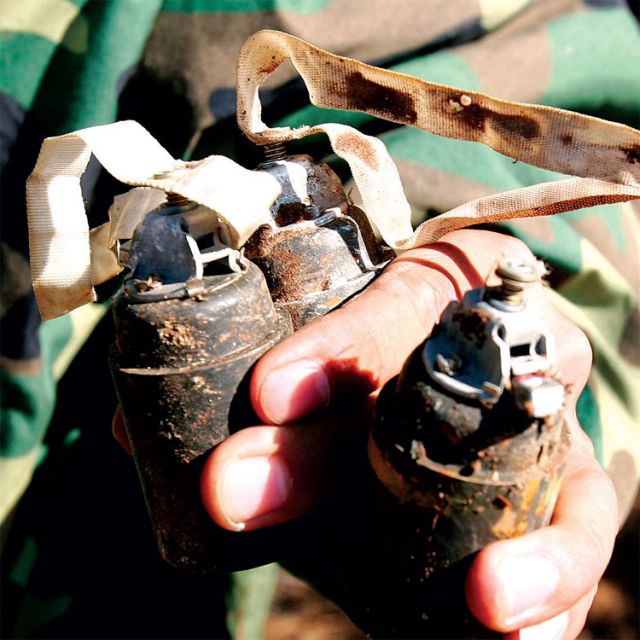While diplomatically refusing to comment specifically on Canada, the Holy See’s chief negotiator on the Convention on Cluster Munitions told the Canadian Press “it will not be so helpful for international humanitarian law” for countries to pass ratifying legislation that contradicts their signature on the treaty.
“It means that we adopt and then sign conventions and later on when we would like to ratify, we weaken what we signed,” Fr. Antoine Abi Ghanem is quoted saying in a June 17 wire service story.
An inside source with ties to the Vatican’s diplomatic corps told The Catholic Register there can be no doubt the Holy See is diplomatically taking Canada to task over the cluster bomb treaty.
“The Holy See is always careful in its diplomacy. It has to maintain relations with a lot of governments,” the source said. “But the Holy See has indeed taken note of the Canadian government’s unhelpful action in so diluting the (cluster) munitions treaty as to make it ineffectual.”
Canada was one of the first countries to sign the anti-cluster bomb treaty Dec. 3, 2008. But Ottawa still hasn’t ratified its signature by passing a law in Canada. Bill S-10 first proposed in 2012 has been through Senate hearings and passed second reading in June. The law has been criticized for broad exceptions that would allow Canadian officers to command foreign troops to order the use of cluster bombs, allow Canadian troops to transport cluster bombs to the field of battle and otherwise aid and abet cluster bomb attacks.
“The reservations are so huge that they effectively nullify the treaty and set a very poor example internationally,” said Project Ploughshares executive director John Siebert. Project Ploughshares was established by the Canadian Council of Churches, which includes the Canadian Conference of Catholic Bishops.
The government claims it needs exceptions to the cluster bomb treaty in order to work effectively with the United States on joint missions. The United States has not signed the treaty and continues to hold cluster bombs as an option in its military planning.
The Holy See’s unusual step of granting an interview to a wire service was clearly “a gentle admonition or a gentle reminder of obligations that entail when these treaties are signed by states or non-state actors,” said King’s University College historian Robert Ventresca, an expert in Vatican diplomatic history.
While Abi Ghanem’s statement stops short of direct criticism of Canada, “there’s an implicit criticism,” said Ventresca.
“The language is very careful and very balanced. There’s an appeal to general principle rather than an explicit critique of any named country.”
Along with Ireland, New Zealand, Mexico and Austria, the Holy See was one of the principal states aiding Norway as it pulled together the treaty in what became known as the Oslo Process. Canada’s major contribution to the treaty was to craft a narrow set of exceptions intended to allow NATO countries to sign and still be able to work with the U.S. military.
Russia, China, Israel and some smaller countries have also declined to sign the treaty.
Canada’s lead diplomat on the treaty resigned from Canada’s foreign service when the enabling legislation was proposed by a joint committee of Foreign Affairs and Defence.
“I negotiated this treaty in good faith and simply cannot reconcile such actions with the obligations contained in the treaty and Canada’s stated intentions throughout the negotiations,” diplomat Earl Turcotte said.
Pope Benedict XVI praised the cluster bomb treaty when it came into force in 2010.
“The international community has demonstrated wisdom, foresight and the capacity to pursue a meaningful result in the field of disarmament and international human rights,” Benedict said. “The logic of peace is stronger than the logic of war, which in every case must have as an insurmountable limit the protection and preservation of the civil population and particularly the most vulnerable.”
Every study of cluster bombs has shown the majority of victims are civilians. Unexploded bombs continue to maim children and others after wars have ended.
The issue goes beyond Canada signing a disarmament treaty then writing legislation to allow Canadian soldiers to order the use and to transport banned weapons, said Siebert. On several fronts — failure to sign a humanitarian statement against nuclear weapons last year, failure to support the Arms Trade Treaty — it shows Canada retreating from multilateral disarmament, he said. When it comes to banning a weapon whose victims are almost exclusively civilian, there should be no hesitation, said Siebert.
“Clearly the humanitarian implications of cluster (bombs) plus anti-personnel mines are so devastating and primarily focused on civilians that it’s in all our Gospel interests to see them banned,” he said.
Foreign Affairs Minister John Baird’s office did not reply to requests for comment.

